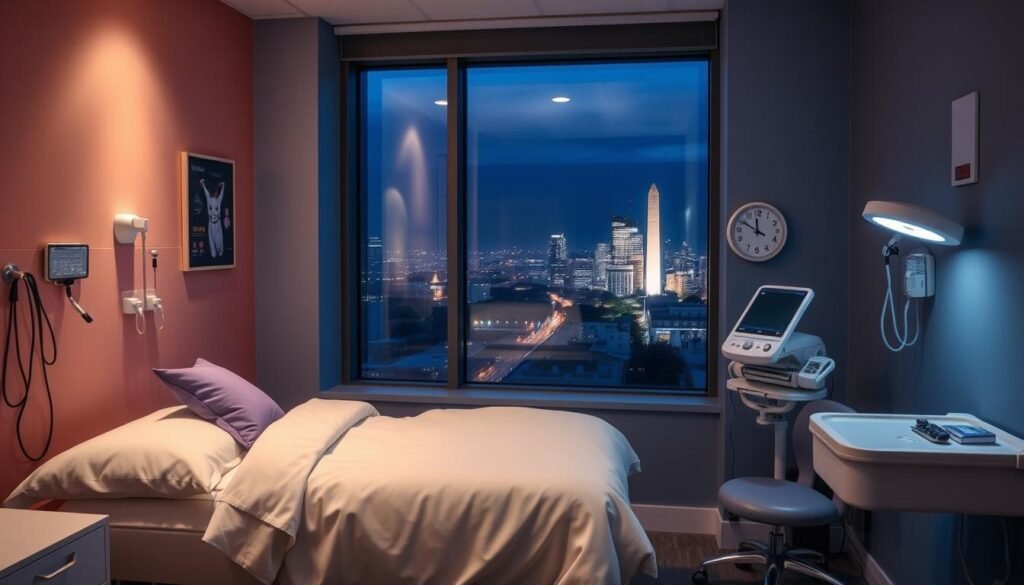Did you know nearly 30% of Americans face insomnia at some stage? It’s crucial to address this to prevent serious health issues. Issues like heart attacks and strokes are more likely with sleep disorders. Luckily, Washington, DC has many solutions to tackle insomnia and help people sleep better.
In Washington, DC, the choices for tackling insomnia vary widely. Cognitive behavioral therapy and advanced treatments from local experts are available. At Sibley Memorial Hospital’s Sleep Disorders Center, experts conduct thorough sleep studies. They offer customized help, making it easier for patients to overcome their sleep issues. This article will delve into the many insomnia treatment options in DC, aiming to guide you towards improved sleep and health.
Key Takeaways
- 30% of Americans report experiencing insomnia at some point in their lives.
- Untreated insomnia can double the risk of cardiovascular diseases.
- Sibley Memorial Hospital offers specialized evaluations for sleep disorders.
- The average adult needs 7-9 hours of sleep per night for optimal health.
- Chronic insomnia lasts three months or longer, impacting daily functioning.
- Local sleep specialists provide tailored support for diverse treatment options.
- The Sleep Disorders Center in DC ensures quick evaluation feedback from board-certified physicians.
Understanding Insomnia: Definition and Symptoms
Insomnia is a sleep disorder that makes it hard to fall or stay asleep or causes you to wake up too soon. It can make daily tasks hard to do because it leads to tiredness, crankiness, and trouble focusing. To be diagnosed with insomnia, these problems must occur at least three nights a week for a month. Insomnia has many causes, including mental and physical health issues.
What Constitutes Insomnia?
About 30% of adults worldwide show signs of insomnia. Only 10% of these affect their day activities or cause distress. Using strict criteria, about 6% of people are currently diagnosed with insomnia. It’s also linked with other medical conditions in 75% to 90% of cases. Knowing this helps in finding the right treatment early to stop it from getting worse.
Common Symptoms of Insomnia
The symptoms of insomnia can lower your life quality. They include:
- Difficulty initiating sleep: This affects 30-40% of those with insomnia.
- Challenges in maintaining sleep: Seen in 50-60% of cases.
- Daytime fatigue and irritability: This impacts 20-30% of people’s daily life.
Chronic insomnia disorder is found in 10-15% of adults. Many can’t get restful sleep even when they have the chance. It’s important to recognize these signs early to get the right help in DC.
If insomnia is making your life hard, learning about it is the first step to better sleep. Seeing an expert can help get insomnia treatment options that are right for you. This can address all the factors of this complicated disorder.
Types of Insomnia and Their Impact
Insomnia comes in different forms, such as acute and chronic. Knowing these types helps find the right solutions for sleep problems. Each kind affects daily life in specific ways.
Acute vs. Chronic Insomnia
Acute insomnia is short-term, caused by stress or events that shake us up. It lasts a few days to weeks. On the other hand, chronic insomnia lasts over three months. It is usually due to health problems or lifestyle habits. Studies show that 25% of women and 18% of men suffer from insomnia. A shocking 70 million people in the U.S. have sleep disorders. This shows why getting help from a sleep specialist is key.
Effects of Insomnia on Daily Life
Insomnia can make daily life hard, leading to problems like:
- Attention and memory issues
- Feeling sleepy during the day
- Mood swings
It can lower productivity and harm relationships. This underlines the need for the right treatment. As half of older people have trouble sleeping, finding solutions is crucial. To learn more about insomnia types, the Sleep Foundation has great info.

Insomnia Treatment Options in Washington, DC
In Washington, DC, many ways exist to help with insomnia. They meet various needs, making it easier for people to find what works for them. This is vital as over 40 million Americans face sleep issues. Finding the right insomnia treatment in DC for each person is key.
Overview of Available Treatment Methods
There are several effective methods to manage insomnia:
- Cognitive Behavioral Therapy for Insomnia (CBT-I): This top method works on the thoughts and actions that affect sleep.
- Pharmacological Solutions: Drugs can help for a short while. They are often part of a larger plan.
- Natural Treatments: Changes in life and natural remedies can improve results from other treatments.
- Continuous Positive Airway Pressure (CPAP): This helps those with sleep apnea, where breathing stops and starts during sleep.
Finding the Right Treatment for Individual Needs
Choosing the best treatment depends on personal health, life, and what you prefer. Specialists in DC can give advice suited just for you. The GW Center for Sleep Disorders does thorough checks to pinpoint the sleep issue correctly.
If you’re looking for insomnia help near you, there are plans made just for your needs. Science groups like the National Institutes of Health work with clinics to make insomnia treatments better.
Insomnia Treatment DC: Why Local Specialists Matter
Getting help from local sleep experts is a big plus for insomnia sufferers. A sleep specialist in Washington DC knows the unique sleep issues of the area. They create personal treatment plans for each patient.
Benefits of Consulting Sleep Specialists
Seeing a sleep specialist Washington DC brings lasting benefits. Here are some key advantages:
- Customized Treatment Plans: They craft care based on your specific needs.
- Comprehensive Diagnosis: They perform detailed checks to spot the root causes of your sleep problems.
- Expert Guidance: These experts keep up with the newest treatment options.
- Informed Recommendations: They recommend lifestyle adjustments and therapies that work best for locals.
Top Insomnia Clinics in DC
Below are top-rated insomnia clinics in DC known for their specialized care:
| Clinic Name | Location | Services Offered | Website |
|---|---|---|---|
| Washington Sleep Center | 1100 15th St NW #300, Washington, DC | Sleep disorder evaluations, CBT-I, and sleep studies | www.washingtonsleepcenter.com |
| American Academy of Sleep Medicine | 1120 20th St NW #650, Washington, DC | Diagnosis and treatment for various sleep conditions | www.aasm.org |
| DC Sleep Medicine Center | 1000 N. Glebe Rd, Arlington, VA | Comprehensive sleep evaluations, behavioral therapy | www.dcsleepmedicine.com |
If you have trouble sleeping, think about going to a top insomnia clinic in DC. These centers offer expert treatment in a healing environment. With their help, beating insomnia and finding peaceful sleep is possible.

Cognitive Behavioral Therapy for Insomnia
About 10% of adults suffer from chronic insomnia, equaling around 26 million people in the U.S. Cognitive Behavioral Therapy for Insomnia, or CBT-I, is a structured program to help. It helps by changing the thoughts and behaviors that affect sleep. This approach is effective for both short-term and long-term insomnia, as the American Academy of Sleep Medicine recognizes. Visit this link for more insomnia treatment options.
What is CBT-I?
CBT-I mixes behavioral methods and cognitive restructuring to tackle insomnia’s core issues. It ranges from four to eight sessions, offering a brief solution for those without extra mental health challenges. Most who try CBT-I, about 70%-80%, find their sleep significantly improves.
Effectiveness of CBT-I Compared to Medication
Sleep medications often fall short in the long run and can have unwanted side effects. CBT-I, however, not only targets insomnia but also promotes lasting sleep practices. People usually see improvements quicker than with other therapy types. Thus, CBT-I is the top choice for insomnia therapy.
CBT-I’s dual approach focuses on better sleep hygiene and lifestyle adjustments. Many experts recommend it as the go-to method for fighting insomnia in DC. It includes relaxation exercises, stable sleep schedules, and setting up a good sleeping space. These elements boost its success.
Exploring Medications for Sleep Problems
Knowing about the different insomnia treatments is key for those looking for help. There are both prescription meds and over-the-counter aids. These can help with sleep issues for a while. But, it’s important to think about their good and bad points.
Types of Prescription Medications
Insomnia drugs usually include benzodiazepines and nonbenzodiazepines. Both are regulated substances. They help you fall asleep and stay asleep. Yet, they may lead to dependence and have side effects. Some common choices are:
- Benzodiazepines: Five have been approved by the FDA, effective for short-term use.
- Nonbenzodiazepines (Z drugs): Require a prescription, similar in classification to benzodiazepines.
- Ramelteon: A melatonin receptor agonist that assists with sleep onset insomnia.
- Suvorexant: An orexin receptor antagonist for both sleep onset and maintenance issues.
- Off-label options: Certain antidepressants and antipsychotics may help with insomnia symptoms.
Over-the-Counter Sleep Aids: What to Know
For those not yet considering prescription solutions, over-the-counter aids offer help. Popular choices include:
- Melatonin: A natural sleep hormone that can help regulate sleep-wake cycles.
- Diphenhydramine: An antihistamine known to induce drowsiness.
- L-theanine: An amino acid that may help promote relaxation and improve sleep quality.
Even though over-the-counter options seem easy, talk to a doctor first. This avoids unwanted side effects and drug interactions.

Natural Remedies for Insomnia
Many people manage insomnia with natural remedies. These options can improve sleep without needing medicines. Lifestyle changes and natural sleep aids together can help ease insomnia.
Lifestyle Changes to Improve Sleep
Simple lifestyle tweaks can make a big difference in sleep quality. Consider these strategies:
- Reduce screen time an hour before bed to lessen blue light exposure.
- Try to sleep and wake up at the same time every day.
- Avoid caffeine and big meals at night to help you relax.
- Develop a calming routine before bedtime to signal your body it’s sleep time.
- Use relaxation methods like deep breathing or meditation to lower stress before sleeping.
Popular Natural Sleep Aids
Natural remedies are becoming popular for sleep improvement. Here are some effective options:
| Natural Sleep Aid | Benefits | Notes |
|---|---|---|
| Valerian Root | May help reduce the time it takes to fall asleep | Subject to varying effectiveness in studies |
| Chamomile | Known for its calming properties | Often consumed as tea before bedtime |
| Lavender | Promotes relaxation and improves sleep quality | Aromatherapy with lavender oil is popular |
| Magnesium | May help regulate sleep patterns | Considered essential for overall sleep health |
Trying these natural remedies can support traditional insomnia treatments. They offer a well-rounded approach to better sleep. While results can differ, many find these options helpful for sleep improvement.
Choosing the Best Doctor for Sleep Disorders
Finding the right doctor for sleep issues is key. A qualified specialist makes a big difference with sleep problems. When looking for one, there are important things to keep in mind.
What to Look for in a Sleep Specialist
Here’s what to look for in a sleep expert:
- Board Certification: Make sure they have certification in sleep medicine, showing they’re well-trained.
- Experience: Choose someone who’s treated conditions like insomnia, sleep apnea, and restless leg syndrome before.
- Current Knowledge: Pick a doctor who knows the latest treatments in sleep medicine.
- Comprehensive Approach: Find a specialist who considers your overall health for personalized plans.
The Role of Assessments in Treatment
Good assessments are key to correctly figuring out sleep disorders. At sleep centers, experts use tests to track how your body works while you sleep. These tests help understand your sleep pattern and pinpoint issues. Let’s talk about some tests:
| Assessment Type | Description |
|---|---|
| Polysomnography | This is a detailed study that logs brain activity, oxygen levels, heart rate, and breathing. |
| Home Sleep Apnea Testing | It’s a simple device you use at home to check for sleep apnea. |
| Actigraphy | A device worn on the wrist that monitors your sleep and awake times to judge sleep quality. |
Understanding test results helps patients get involved in their care, leading to better sleep treatment. If you have sleep problems, track your symptoms for weeks before seeing a sleep doctor.
Insomnia Therapy Near Me: Finding Local Support
Seeking effective insomnia treatment in DC can really improve your life. Local therapy gives benefits like personal care and being easy to reach. These are key for dealing with sleep problems. Here’s why getting local help for insomnia in DC is good.
Benefits of Local Therapy Options
- Convenience: Finding a therapist close by eases worries about travel and fitting appointments into your schedule. This makes it easier to keep going to sessions.
- Personalized Care: Local experts know what the community faces and customize treatment to match. This can make a big difference.
- Building Rapport: Seeing the same therapist often helps build a strong bond. This is very important for the therapy to work well.
How to Locate a Sleep Therapist
Finding a good sleep therapist in Washington, DC involves a few key steps. Start with online directories that list mental health experts. These resources have info on therapists who know a lot about treating insomnia in DC.
Asking for recommendations from people you trust can also lead you to good therapists. Plus, looking at what other patients say on clinic websites can give you an idea of how effective the therapists are.
| Method | Description |
|---|---|
| Online Directories | These websites list therapists with a focus on sleep problems. |
| Referrals | Getting advice from people you know often helps find reliable therapists. |
| Patient Testimonials | Feedback from others can show how well a therapist works. |
Using these approaches makes it more likely you’ll find good help for insomnia in DC. For treatments based on science, think about trying Cognitive Behavioral Therapy. It’s a top method for dealing with insomnia. Discover the benefits of this approach here.
Long-Term Solutions for Insomnia
Finding long-term fixes for insomnia means really committing to change. Lots of people fight with sleep troubles. In fact, over 40 million in the U.S. have chronic sleep issues. To beat these problems, creating good sleep habits is key for health.
Creating Sustainable Sleep Habits
To sleep better, there are some practical steps you can take. They mix insomnia solutions with natural treatments.
- Consistent Sleep Schedule: Go to bed and wake up at the same times daily for regular body rhythms.
- Relaxing Bedtime Routine: Create calming pre-sleep rituals. Activities like reading or gentle stretching work well.
- Optimal Sleep Environment: Make your bedroom dark, quiet, and cool to sleep better.
- Avoid Stimulants: Don’t have caffeine and nicotine late in the day.
- Healthy Lifestyle Choices: Exercise regularly, but not right before bed.
Online cognitive therapy has helped those with particular sleep issues. Behavioral therapy can work as well as pills for some. It helps people develop and keep up with sleep-positive habits on their own.
Mixing these methods tackles sleep problems now and in the future. As these lifestyle changes become habits, sleep and daily life both get better.
| Strategy | Description |
|---|---|
| Consistent Sleep Schedule | Keep sleep and wake times stable to steady sleep patterns. |
| Relaxing Bedtime Routine | Do relaxing things before bed to ease into sleep. |
| Optimal Sleep Environment | Make a sleep-friendly area that’s dark, quiet, and cool. |
| Avoid Stimulants | Cut down on caffeine and nicotine in the evening. |
| Healthy Lifestyle Choices | Fit in exercise, but avoid it late in the day. |
Conclusion
Knowing how to handle insomnia is key for good health. Between 10% to 15% of people deal with it. Spotting insomnia symptoms is your first step to get good sleep again. There are many ways to help, from changing your day-to-day habits to getting therapy.
Finding the right doctor for sleep issues is super important. They should offer treatments that fit you perfectly. Since not treating chronic insomnia might lead to big health problems, getting help early is smart. Treatments include therapy or sometimes medication in Washington, DC.
With today’s busy world, sleep often takes a backseat. But, it’s important to act early to fix sleep troubles. Knowing your options and talking to a DC sleep expert can change your sleep for the better. This way, you can enjoy a better life.
Pingback: How Long Does Insomnia Last? Tips to Find Relief – Biotinbloom